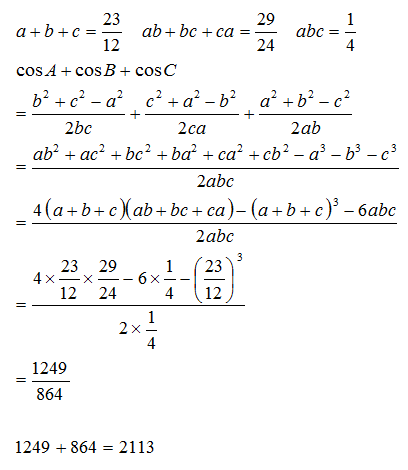How will you do this elegantly?
Consider a triangle whose semi-perimeter is , sum of products of two sides is , product of all sides is .If the sum of cosines of the angles of this triangle can be expressed as where are coprime integers , find .
Advice: Do this without actually calculating the sides of the triangle.
The answer is 2113.
This section requires Javascript.
You are seeing this because something didn't load right. We suggest you, (a) try
refreshing the page, (b) enabling javascript if it is disabled on your browser and,
finally, (c)
loading the
non-javascript version of this page
. We're sorry about the hassle.

a + b + c = 1 2 2 3 a b + b c + a c = 2 4 2 9 a b c = 4 1 a 2 + b 2 + c 2 = ( a + b + c ) 2 − 2 ( a b + b c + a c ) = 1 4 4 1 8 1 a 3 + b 3 + c 3 = ( a + b + c ) 3 − 3 ( a + b + c ) ( a b + b c + a c ) + 3 a b c = 1 7 2 8 1 4 5 7 c o s ( A ) + c o s ( B ) + c o s ( C ) = 2 a b a 2 + b 2 − c 2 + 2 b c b 2 + c 2 − a 2 + 2 a c a 2 + c 2 − b 2 = 2 1 [ a b a 2 + b 2 + c 2 − 2 c 2 + b c b 2 + c 2 + a 2 − 2 a 2 + a b c a 2 + c 2 + b 2 − 2 b 2 ] = 2 1 [ a b c 1 4 4 1 8 1 c − 2 c 3 + 1 4 4 1 8 1 a − 2 a 3 + 1 4 4 1 8 1 b − 2 b 3 ] = 2 1 [ 4 1 1 4 4 1 8 1 ∗ 1 2 2 3 − 2 ∗ 1 7 2 8 1 4 5 7 ] = 8 6 4 1 2 4 9 Answer: 1 2 4 9 + 8 6 4 = 2 1 1 3